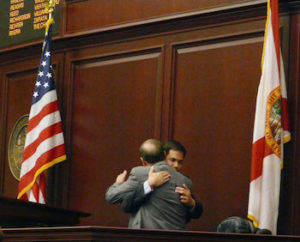
Rubio and Pruitt embrace
*On this date in 2008, more than 140 years after a former Florida governor described Africans as "a wild barbarian to be tamed and civilized," the Legislature apologized for the state's role in sanctioning Chattel slavery.
The House and Senate approved a resolution expressing "profound regret for the involuntary servitude of Africans and calling for reconciliation among all Floridians." There was no discussion before the unanimous voice votes. Still, the resolution reading, which described how slaves' ears were nailed to posts during whippings, brought some lawmakers, including Black Democratic Tampa Sen. Arthenia Joyner, to tears. Gov. Charlie Crist visited the Senate chamber to watch the vote. In the House, Speaker Marco Rubio, R-West Miami, took the unusual step of ordering all members to their seats. And in a rare appearance, Senate President Ken Pruitt, R-Port St. Lucie, sat at Rubio's side. "This was as sincere and as meaningful an apology as could be given," Pruitt said. "It was important for the words to stand on their own."
The resolution did not address reparations. As news of the vote spread, public reaction on the St. Petersburg Times' Web site, tampabay.com, varied. Some readers accused lawmakers of "wasting" time and questioned why an apology was needed when all slave owners were dead. Others said it wasn't enough; reparations are in order. Some commended lawmakers, saying they hoped it would help heal society's racial strife. With the 2008 vote, Florida joins five other states, Alabama, Virginia, Maryland, North Carolina, and New Jersey, that have apologized for slavery. Sen. Tony Hill, a longtime Democratic lawmaker and head of the black caucus, who worked with Pruitt for months on the matter, initiated Florida’s apology.
Just before the American Civil War, in 1860, there were nearly 62,000 slaves in Florida, 44 percent of the state population, and their subjugation was embedded in the culture. In a letter in 1861, former territorial governor Richard Keith Call described "persons of African descent" as "an animal, in the form of a man, possessing the greatest physical power & without one principle of his nature, one faculty of mind or feeling of heart, without spirit or pride of character, to enable him to regard slavery as a degradation."
By Call's letter, slaves had been in Florida for three centuries, starting in the late 1500s, when the Spanish used them to build forts. The British imported slaves to Florida between 1763 and 1783, and the coastline was a popular dock for ships carrying slaves intended for other states. But the practice grew significantly when Florida became a U.S. territory in the early 1800s.
Plantation owners from Virginia, Carolina's and other Southern states moved their operations and slaves to Florida's cheaper land, primarily in the Panhandle. Old Capitol curator John Phelps recounted some of that history for senators, reading from historical documents, including Call's letter. He told senators about slave codes and laws from the 1820s that spelled out slave punishments, including having their ears nailed to posts while they stood for an hour and receiving "lashes on his or her bareback." Legalized slavery ended in Florida after the war with the approval of the 1868 state Constitution, but not until Wednesday did the state apologize. Some lawmakers worry the apology could open a flood of apologies to other groups, from women who previously couldn't vote to Indians whose land was taken.
The resolution:
WHEREAS, African slavery was sanctioned and enforced through laws enacted by Florida's first Territorial Legislative Council in 1822, and
WHEREAS, the Council and its successors did, over four decades, construct a legal framework that perpetuated African slavery in one of its most brutal and dehumanizing forms, and
WHEREAS, this legal framework included such lawful punishments as the following: "That any negro or other slave duly convicted of robbery & or burglary shall suffer death or have his or her ears nailed to posts and there stand for one hour and receive 30 lashes on his or her bareback at the discretion of the court," and
WHEREAS, in 1827, free Africans were denied the right to vote and in later years were, by law, so repressed, restricted, and harassed that by 1850 most had been driven from Florida, and
WHEREAS, African slavery was entrenched within the plantation culture of Middle Florida to such a degree that by the year 1860, 73 percent of the total population of Leon County were slaves, and
WHEREAS, there were early political leaders in Florida who advocated a vigorous defense of slavery, and
WHEREAS, the Florida Legislature has identified grave injustices inflicted upon African slaves and freemen by the state, and
WHEREAS, even though the laws permitting such injustices have been repealed, it is important that the Legislature express profound regret for the shameful chapter in this state's history and, in so doing, promote healing and reconciliation among all Floridians, NOW, THEREFORE, Be It Resolved by the Senate of the State of Florida, the House of Representatives Concurring: That the Legislature expresses its profound regret for Florida's role in sanctioning and perpetuating involuntary servitude upon generations of African slaves.
BE IT FURTHER RESOLVED that the Legislature calls for healing and reconciliation among all state residents.
